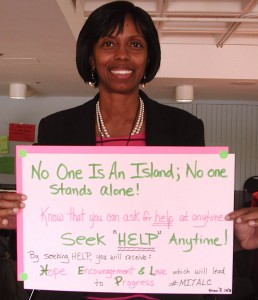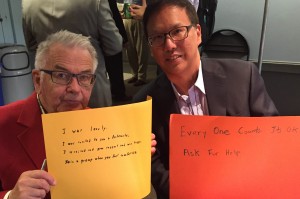Alumni Add “Heart” to MindHandHeart
-
-
slice.mit.edu
Filed Under
Recommended

Guest Blogger: Sarah Goodman, Dean for Graduate Education Office
Alumni and students joined together this fall to send the campus community a message—“Don’t struggle alone—It’s okay to ask for help.” That phrase served as a backbone for the two events at the Alumni Leadership Conference that focused on the MindHandHeart Initiative (MHH), a campus-wide effort to promote mental health and well-being and, over time, build a healthier, stronger MIT.
First, Chancellor Cynthia Barnhart SM ’86, PhD ’88 lead a panel discussion with students Lorraine Wong ’17 and Ariella Yosafat ’16 from Active Minds, a student activity group dedicated to raising mental health awareness and encouraging help-seeking. “The idea of the MindHandHeart Initiative,” the chancellor explained, “is to bring all of the different people in our community together around this topic of mental health and well-being on campus.”

The second event was an alumni message-making activity introducing MIT’s “Don’t struggle alone—It’s okay to ask for help” campaign. Yosafat joined the alums along with students Nolan Concannon ’17 from Save TFP, and Blake Elias ’16 from the Art of Living. Other groups actively involved in the Ask for Help campaign are the undergraduate peer counseling group Peer Ears and the graduate-student peer-counseling group, Resources for Easing Friction and Stress (REFS). The round tables of Mezzanine Lounge W20 buzzed with discussion about data from the 2015 Healthy Minds Study Barnhart had presented at her talk.
Alumni brainstormed ways to send messages of support to students—messages about asking for help, going it together, and taking the stigma out of struggle at MIT. The wall of Mezzanine Lounge and the walls of @MITstudents and @MITGradlink social media beamed alumni encouragement and courage. The messages range from general to personal. Styles varied from dashed-off to nuanced with puns, poetry, and graphic flair.
Since the chancellor and MIT Medical Director, William Kettle, announced the MindHandHeart initiative with a letter to the MIT community on September 2, more than 150 faculty, students, and staff have volunteered to participate in the program. Dozens more have submitted ideas to the MHH Innovation Fund and counseling services have expanded on campus.
Top 5 Ways Alumni Can Help MindHandHeart
- Learn about the initiative. Read the letter, the MIT News story and MindHandHeart.mit.edu Read the 2015 Healthy Minds Study results on chancellor.mit.edu
- Come to events if local. “Wellness” and “Health” tags have been added to the MIT events calendar!
- Watch peer-to-peer videos, read stories, and download materials at the "Ask for Help" page. Submit your story about asking for help at MIT to askforhelp@mit.edu
- Stay connected to the community. Use the Infinite Connection, alumni clubs, become an educational counselor, and other volunteer efforts.
- Spread the word. Take a picture of yourself holding up your own “Ask for help” message. Post it with the hashtags #askforhelpMIT #mindhandheart and tag @mindhandheart @MITgradstudents and @MITstudents, or send it to askforhelp@mit.edu or mindhandheart@mit.edu







